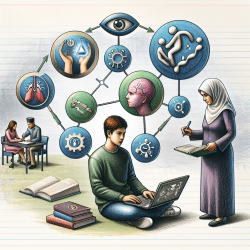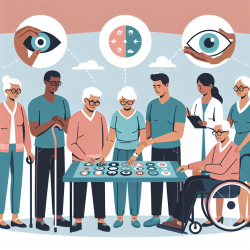Empowering Practitioners: Turning Challenges into Opportunities for Growth
In the ever-evolving landscape of public health, practitioners face numerous challenges that demand both adaptability and resilience. One such challenge is the threat of bioterrorism, a topic explored in depth by McDade and Franz in their research article, Bioterrorism as a Public Health Threat (1998). While this may seem distant from the daily practice of speech-language pathologists, there are valuable lessons to be learned that can enhance our professional skills and improve outcomes for children.
Understanding the Threat
Bioterrorism, as defined in the research, involves the deliberate release of viruses, bacteria, or other germs to cause illness or death in people, animals, or plants. The implications for public health are significant, requiring practitioners to be vigilant and prepared for potential outbreaks. While this might seem like a topic for epidemiologists, the underlying principles of preparedness and response are universal and can be applied across various fields, including speech-language pathology.
Applying Research to Practice
Here are some key takeaways from the research that practitioners can implement to enhance their skills and improve outcomes:
- Data-Driven Decision Making: Just as public health officials rely on data to track and respond to bioterrorism threats, speech-language pathologists can use data to inform their therapeutic approaches. By collecting and analyzing data on student progress, practitioners can make informed decisions about treatment plans and adjust strategies to better meet individual needs.
- Preparedness and Flexibility: The research highlights the importance of being prepared for unexpected events. For practitioners, this means being flexible and ready to adapt therapy sessions to accommodate sudden changes, such as school closures or shifts to online learning environments. This flexibility ensures that therapy continues uninterrupted, providing consistent support for children.
- Collaboration and Communication: Effective response to bioterrorism involves collaboration across various sectors. Similarly, speech-language pathologists can enhance outcomes by collaborating with teachers, parents, and other professionals. Open communication ensures that everyone involved in a child's education is aligned and working towards common goals.
Encouraging Further Research
While the research on bioterrorism provides valuable insights, it also underscores the importance of continuous learning and research. Practitioners are encouraged to stay informed about emerging trends and challenges in public health and consider how these might impact their practice. Engaging in ongoing professional development and research not only enhances individual skills but also contributes to the broader field of speech-language pathology.
To read the original research paper, please follow this link: Bioterrorism as a public health threat.










